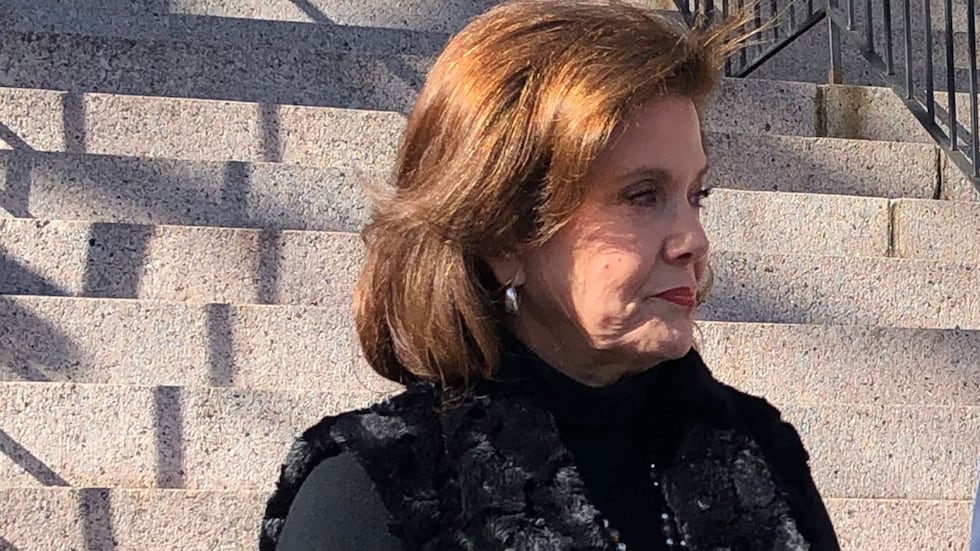WACO, Texas (KWTX) – Texas judges who decline to perform gay weddings based on their religious beliefs are not subject to sanctions governing judicial impartiality, the Texas Supreme Court ruled in a comment added to the state’s Code of Judicial Conduct.
The high court’s comment, added Friday to Canon 4 of the Texas Code of Judicial Conduct, said, “It is not a violation of these canons for a judge to publicly refrain from performing a wedding ceremony based upon a sincerely held religious belief.”
The comment could have statewide implications for gay marriage and helps clarify challenges and sanctions facing judges who decline to perform such ceremonies based on their religious beliefs.
McLennan County Justice of the Peace Dianne Hensley was sanctioned by the State Commission on Judicial Conduct in 2019 for declining to officiate at gay marriage ceremonies. The commission said her actions cast doubt on her capacity to act impartially for persons appearing before her because of sexual orientation.
 Republican McLennan County Pct. 1, Pl. 1 Justice of the Peace Dianne Hensley was warned over her refusal to perform same-sex weddings. (Photo by John Carroll)(KWTX)
Republican McLennan County Pct. 1, Pl. 1 Justice of the Peace Dianne Hensley was warned over her refusal to perform same-sex weddings. (Photo by John Carroll)(KWTX)
Hensley appealed the sanctions based on her religious freedoms and ultimately sued the commission, a lawsuit that remains pending in Travis County but one Hensley hopes can be resolved in the near future with the new guidance from the Supreme Court.
The commission withdrew its sanction against Hensley after adverse appellate court rulings.
“I am deeply grateful that the Supreme Court clarified the judicial canon to protect religious rights, and going forward, every judge in Texas will enjoy the freedom to follow his or her conscience on this issue,” Hensley said Tuesday. “As far as my case goes, the comment offered by the Supreme Court should resolve the issue that led to my erroneous sanction, and I hope the commission will move to wrap up this case as quickly as possible in my favor.”
Jacqueline R. Habersham, executive director of the State Commission on Judicial Conduct, declined comment on the case Tuesday.
Hensley, a Republican who took office in 2015, said earlier this year she would seek re-election so she could pursue her lawsuit as a sitting judge. However, she said Tuesday if the suit can be resolved soon, she is having second thoughts about running again.
She said she is continuing to pursue the lawsuit against the commission in an effort to recover the almost $500,000 in attorneys’ fees and expenses racked up so far. She is represented by the conservative religious freedom group First Liberty Institute and attorney Jonathan Mitchell.
“I really appreciate all the support I have gotten,” Hensley said. “I will talk to my attorneys to see if we can wrap this up, and if we can, I probably won’t file for office.”
Hiram Sasser, executive general counsel at First Liberty Institute, said, “We are heartened by the Supreme Court’s amendment to the canons to protect religious liberty. Now going forward, every judge in Texas will enjoy the freedom Judge Hensley has fought so hard for in her case. As for her case specifically, this amendment melts away the reasons the Commission relied on to punish Judge Hensley.”
The Texas Supreme Court in June 2024 gave Hensley permission to sue the commission, reversing two lower court opinions that said Hensley failed to exhaust her administrative remedies before filing her lawsuit.
The 3rd Court of Appeals affirmed 459th State District Judge Jan Soifer’s decision to dismiss Hensley’s lawsuit against the commission. Hensley’s lawsuit initially was filed in McLennan County. However, it was transferred to Travis County after a contested hearing.
The lower courts dismissed Hensley’s case because she didn’t exhaust her internal appeal options. The courts granted the commission sovereign immunity, ruling the state governmental agency was protected from liability.
The 2024 Supreme Court opinion said Hensley is allowed to file a lawsuit asserting her Texas religious freedom claim without first appealing internally. The high court also ruled that the commission’s sovereign immunity claims don’t apply.
In a concurring opinion, Supreme Court Justice Jimmy Blacklock, who is now the court’s chief justice, wrote the court should have ruled in favor of Hensley’s claims that being punished for not marrying same-sex couples violates her religious freedom.
The commission’s public warning against Hensley said she violated the Texas Code of Judicial Conduct by “casting doubt on her capacity to act impartially to persons appearing before her as a judge due to the person’s sexual orientation.” It also said she has refused to perform same-sex weddings since August 2016, despite the 2015 U.S. Supreme Court decision that established constitutional rights to same-sex marriage.
After the landmark U.S. Supreme Court ruling, McLennan County judges were advised to either perform weddings for everyone or no one. Most justices of the peace opted out of weddings altogether, which also ended a decades-long tradition of a mass Valentine’s Day wedding on the steps of the McLennan County Courthouse. Hensley initially followed suit, but later started officiating at weddings between men and women. She said her office gave same-sex couples wanting to get married a list of officiants willing to perform gay weddings.
Copyright 2025 KWTX. All rights reserved.

